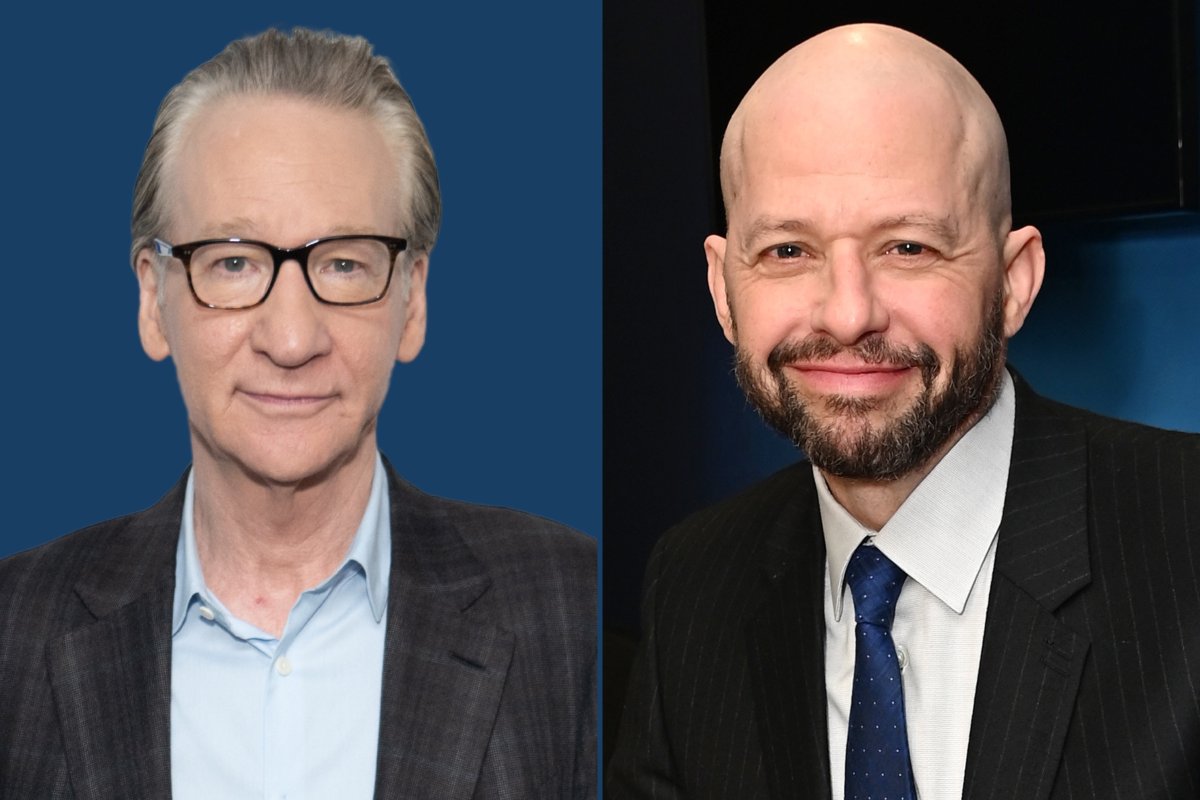Bill Maher clashed with actor Jon Cryer as the two engaged in a spirited debate about transgender people during an episode of the comedian's podcast.
Former Two and a Half Men star Cryer made an appearance on January 5's installment of Club Random with Bill Maher, where he spoke with the titular host about a range of issues, including youth gender-affirming care.
While Maher expressed opposition to children going through gender-affirming care, he also questioned the rise in numbers of young people identifying as transgender.
Cryer countered by suggesting that when certain identities and attributes are more widely accepted in society, it affects the numbers of those who will identify as such, using the onetime vilification of left-handed people as an example.
Newsweek has contacted representatives of Maher and Cryer via email for comment.
"There are cases where it is appropriate, I think," Maher said of gender-affirming care. "I think this is the standard liberal position. And then there's like, the people who won't admit that some of this is social contagion, some of this is just a TikTok trend that got out of hand."
When Cryer said that he disagreed, he said: "Trust me, in this town, you'll be the big champion—'You owned Bill Maher'—because they just want to agree with you."
"The people in this town, they just want to be warriors, social justice warriors," Maher added in refence to Hollywood. "So they're just always looking for a cause, and it's so much more often about them than the cause itself—not that there's not [sincerity] about stuff."
Referencing Dave Chappelle, who has faced backlash in recent years over his own comments about transgender people, Maher went on: "What bugs Dave Chappelle, so much about the trans thing, I think, is the fact that they want to make it the social just issue of their generation, and it just doesn't compare to other ones.
"It's important. It's an issue. I think it's great [that] we live at a time when trans people can be respected and protected, but you're asking too much often to rewrite like the idea that when someone is born, there is a default setting for humans—male and female. Not everyone is. Now, a real conservative would say, 'No, everyone is.' I would never say that. I think there's a default setting."

Speaking of the experiences of families with trans children, Cryer told Maher: "The people that go through it don't say, 'This is the life I want.' No parent wants to be in the midst of those choices."
"Some kids these days actually just do want to be trans," Maher interjected. "It's cool... It's thing."
"I don't agree," said Cryer, prompting Maher to ask: "Why is it so much more prevalent here than Indiana? Are they suppressing it there?"
"It's like left-handedism," Cryer responded. "Being left-handed was suppressed for thousands of years amongst human beings. But... apparently, in the '30s, scientists basically said... left-handedness doesn't actually do anything bad. Left-handedness shot up. People just stopped training themselves to be right-handed."
As the debate heated up, Cryer criticized Republicans, who he said spent "hundreds of millions of dollars demonizing trans people," calling it "f****** loathsome."
"OK, that's politics, sweetheart," Maher quipped, prompting Cryer to snap back: "No, it's not."
Mater said: "Excuse me, you give them an opening like..."
"An opening like people deserve respect, yeah that's the opening," Cryer interjected.
"Oh God, deprogrammer please come in soon," Maher said, to which Cryer said: "Can we get the deprogrammer? I want to deprogram you."
Maher said: "Well, you're doing a bad..."
"You do this for a living," Cryer quipped, with a laugh.
Gender affirming care has become a contentious political topic, with over half of the states in the U.S. having enacted laws and policies that limit youth access.
Republicans have long touted that bans on gender-affirming care would protect children from making harmful lifetime decisions before they're capable of deciding whether they want to fully transition. Those in favor of gender-affirming care say that preventing access to these services can cause long term suffering and mental health problems for children and teens who aren't able to live in a body that feels like their own.
A U.S. Centers for Disease Control and Prevention (CDC) survey published in October 2024 found that in 2023, 3.3 percent of U.S. high school students identified as transgender and 2.2 percent identified as questioning.
A study by researchers at Harvard T.H. Chan School of Public Health published in June, found gender affirming surgeries in minors are rare.
Using data from 2019, the study reported no gender-affirming surgeries for transgender youths aged 12 and under. Among teens ages 15 to 17, the rate was 2.1 per 100,000, and 5.3 per 100,000 for adults 18 and older.
Most youth gender-affirming care is non-surgical, and can include counseling, hormone therapy, and puberty blockers. According to the Mayo Clinic, puberty blockers "don't cause permanent physical changes. Instead, they pause puberty," noting that when a person stops taking the blockers, "puberty starts again."




















 English (US) ·
English (US) ·